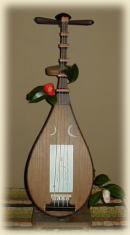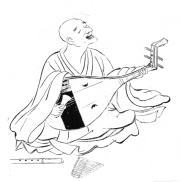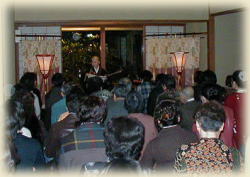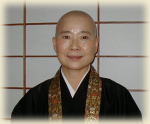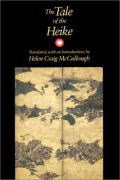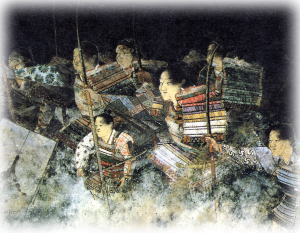|
Kumagae-no-Jiro-Naozane walked his horse toward the beach after the defeat of the Heike.
"The Taira nobles will be fleeing to the water's edge in the hope
of boarding rescue vessels," he thought. "Ah, how I would
like to grapple with a high-ranking Commander-in-Chief!" Just
then, he saw a lone rider splash into the sea, headed toward a vessel in
the offing. The other was attired in a crane-embroidered nerinuki silk hitatare, a suit of armor
with shaded green lacing, and a horned helmet. At his waist, he wore a sword
with gilt bronze fittings; on his back, there rode a quiver containing arrows
fledged with black-banded white eagle feathers. He grasped a rattan-wrapped bow
and bestrode a white-dappled reddish horse with a gold-edged saddle. When his
mount had swum out about a hundred and fifty or two hundred feet, Naozane
beckoned him with his fan.
"I see that you are a Commander-in-Chief. It is dishonorable to show your
back to an enemy. Return!"
The warrior came back. As he was leaving the water, Naozane rode
up alongside him, gripped him with all his strength, crashed with him to
the ground, held him motionless, and pushed aside his helmet to cut off
his head. He was sixteen or seventeen years old, with a lightly powdered
face and blackened teeth. a boy just the age of Naozane's own son Kojiro
Naoie, and so handsome that Naozane could not find a place to strike.
"Who are you? Announce your name. I will spare you," Naozane
said.
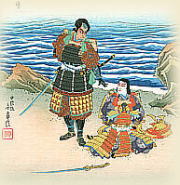 |
| Naozane and Atsumori |
"Who are you?" the youth asked.
"Nobody of any importance: Kumagae no Jiro Naozane, a resident
of Musashi Province."
"Then it is unnecessary to give you my name. I am a desirable
opponent for you. Ask about me after you take my head. Someone will recognize
me, even if I don't tell you."
"Indeed, he must be a Commander-in-Chief," Naozane thought.
"Killing this one person will not change defeat into victory, nor will sparing
him change victory into defeat. When I think of how I grieved when Kojiro
suffered a minor wound, it is easy to imagine the sorrow of this young lord's
father if he were to hear that the boy had been slain. Ah, I would like to
spare him!" Casting a swift glance to the rear, he discovered Sanehira and
Kagetoki coming along behind him with fifty riders.
"I would like to spare you," he said, restraining his tears,
"but there are Genji warriors everywhere. You cannot possibly escape. It will
be better if I kill you than if someone else does it, because I will offer
prayers on your behalf."
"Just take my head and be quick about it."
Overwhelmed by compassion, Naozane could not find a place to
strike. His senses reeled, his wits forsook him, and he was scarcely conscious
of his surroundings. But matters could not go on like that forever: in tears,
he took the head.
"Alas! No lot is as hard as a warrior's. I would never have
suffered such a dreadful experience if I had not been born into a military
house. How cruel I was to kill him!" He pressed his sleeve to his face and
shed floods of tears.
Presently, since matters could not go on like that forever, he
started to remove the youth's armor hitatare so that he might wrap it around the head. A brocade bag containing
a flute was tucked in at the waist. "
Ah, how pitiful! He must have been one of the people I heard making
music inside the stronghold just before dawn. There are tens of thousands
of riders in our eastern armies, but I am sure none of them has brought
a flute to the battlefield. Those court nobles are refined men!"
When Naozane's trophies were presented for Yoshitsune's inspection, they
drew tears from the eyes of all the beholders. It was learned later
that the slain youth was Tayu Atsumori, aged seventeen, a son of Tsunemori,
the Master of the Palace Repairs Office.
After that, Naozane thought increasingly of becoming a
monk.
The flute in question is said to have been given by Retired Emperor Toba to Atsumori's grandfather Tadamori, who was a skilled musician. I believe I have heard that Tsunemori, who inherited it, turned it over to Atsumori because of his son's proficiency as a flutist. Saeda [Little Branch] was its name. It is deeply moving that music, a profane entertainment, should have led a warrior to the religious life.
|

